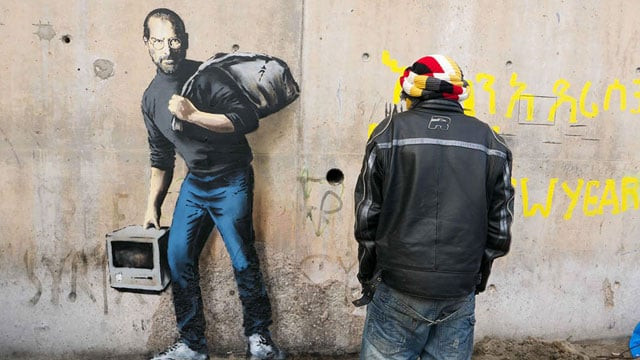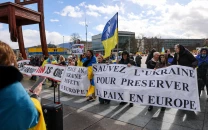Banksy's new work shows Steve Jobs as migrant
Artwork in Calais, France shows Apple founder carrying a bin bag of possessions and an original Apple computer

PHOTO: BANKSY
The work in the so-called ‘Jungle refugee camp’ shows Jobs, the son of a Syrian migrant, in his typical black polo neck carrying a bin bag full of possessions and an original Apple computer.
Banksy’s ‘cat’ sneaks into Gaza, shows what media won’t
In a rare public statement, Banksy said, "We're often led to believe migration is a drain on the country's resources but Steve Jobs was the son of a Syrian migrant.”
 PHOTO: BANKSY
PHOTO: BANKSY"Apple is the world's most profitable company, it pays over $7 billion a year in taxes - and it only exists because they allowed in a young man from Homs," he added.
The artwork is painted near tents and shares the wall with another piece of graffiti which reads: "Nobody deserves to live this way!"
Disneyland turns Dismaland: Darker, grittier and grotesque
The camp in Calais is home to about 7,000 migrants and refugees, the majority from Syria, Afghanistan and Eritrea.
The graffiti is part of a series of works Banksy has created in response to the refugee crisis while in Calais. He covered several walls across the French port with related graffiti, including an adaptation of Theodore Gericault’s Raft of the Medusa, highlighting a luxury yacht which has the message.
 PHOTO: BANKSY
PHOTO: BANKSYEarlier this summer, Banksy initiated a “bemusement” park in Weston-Super-Mare featured an installation of boats filled with bodies. On the last night of Dismaland, Banksy also invited Pussy Riot to debut their song which criticises the global failure to help the migrants reaching Europe.
 PHOTO: DISMALAND.CO.UK
PHOTO: DISMALAND.CO.UKSince the park's closure earlier in September this year, Banksy has been shipping leftover infrastructure from Dismaland to help construct emergency housing for the 7,000 migrants, mainly from Syria, Eritrea and Afghanistan, who now live in Calais.
This article originally appeared on BBC.



















COMMENTS
Comments are moderated and generally will be posted if they are on-topic and not abusive.
For more information, please see our Comments FAQ